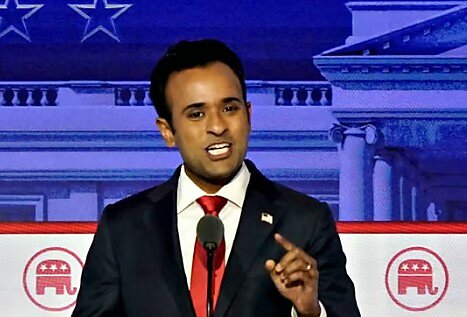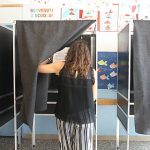
Walter Olson
Election reform does not appear among the 25 planks in Vivek Ramaswamy’s published policy plan. This makes it all the more surprising to learn that the GOP presidential candidate has a four‐point plan to reform elections in the United States, absent the enactment of which he does not think former president Donald Trump should have been required to acknowledge defeat and leave office.
To make matters even worse, if that’s possible, the four‐point plan is both unimpressive and heedless of the states’ historic role in elections.
For those coming in late to this controversy, on Meet the Press, Aug. 27, the biotech‐entrepreneur‐turned‐presidential‐candidate gave an astounding response to a question about Vice President Mike Pence’s options on Jan. 6. He said that, as Pence, he would have certified the election results only if Congress agreed to enact a package of national election reforms, including single‐day voting, paper ballots, and the verification of voter identity through government ID. (Later clarification, with Andrea Mitchell on MSNBC, didn’t help.)
Ramaswamy, whose ideas on the franchise include a role for the passage of civics tests, apparently thinks the vice president can coerce Congress into passing laws on threat of “otherwise we get to stay in power, see?” Confusion about the veep’s powers aside, it is the fantasy of a would‐be caudillo to suspend the constitutional transition of power following an election held under the actually existing rules, in favor of a notional do‐over held under other electoral rules imposed by threat of autocoup.
And all for what? What are the reforms so crucial that an election result obtained without them can be dismissed as illegitimate and not the lawful basis for a change in administrations?
To the three conditions for allowing democratic elections to proceed he recited on Meet the Press — paper ballots, voter ID, and same‐day voting — Ramaswamy added a fourth in a tweet later Sunday, the designation of Election Day as a national holiday.
Let’s take the four one at a time.
* There are legitimate, well‐taken security objections to the use of paperless ballot systems. Does Ramaswamy realize that the pro‐security side won this debate some years back, and that only a few states, none of them swing, have yet to phase out the old paperless technology? Andy Craig points out (source) that the great majority of states have already stopped using the old systems, if they ever did, and that includes every presidential swing state and every state contested by Trump.
* Strict voter ID verification may be a good idea for other reasons such as administrative convenience, and progressive commentators have unfairly attacked its use. But as Cato readers know, a study in the Quarterly Journal of Economics found that“strict ID requirements have no effect on fraud, actual or perceived.” There is no evidence that toughening voter ID procedures in 2020 would have altered the outcome in any state.
* Ramaswamy soon retreated from his talk of abolishing all absentee and mail voting, since deployed military and the like need *some* way to vote. Note that he also demands the abolition of in‐person early voting, which even paranoiacs don’t tend to view as a threat to election integrity. As a practical matter, most voters, including GOP‐leaning retirees, value having some of the new options, which is one reason states have expanded them aside from the incentives created by the COVID-19 pandemic.
* Although unions and liberal elected officials often favor making Election Day a national holiday, many election administrators quietly oppose the idea, suspecting its effects on both turnout and smooth operation of the process will be other than advertised.
To sum up: Among Ramaswamy’s four election reform planks, one is years behind the times; one doesn’t have the advertised effect; one would take away convenience valued by the public; and one is a dubious wish list item of unions and liberal pols. All four, by imposing a uniform national standard, would override states’ discretion to adopt policies reflecting local preferences and circumstances, even though Article 2, Section 1 of the Constitution is careful to reserve almost entirely to the states the key steps in electing the president. There is no evidence that any of the four measures, or all four together, would have changed the result in the 2020 presidential election, or in any one state.
Let’s be frank about the politics here. Ramaswamy is obliged to humor the #StopTheSteal delusion because that’s where a large mass of GOP primary votes are. To the extent there are legitimate conservative reform ideas in the mix, they are sure to get lost in the shuffle.
As states and their governors have shown, there are definitely some legitimate conservative ideas about election reform in circulation, on topics from ballot privacy to speedy tabulation. I spoke with Caleb Brown in 2021 at the Cato podcast about how to disentangle these ideas from the stolen election nonsense. It has gotten no easier since then.





